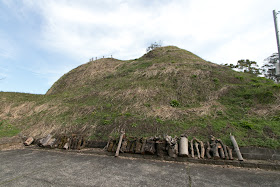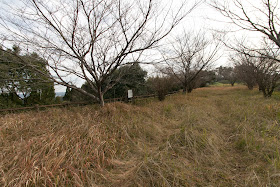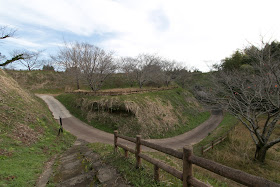Tonokori Castle
-Huge main base of Ito clan spreads over plateau-
Overview
Name: Tonokori castle (Tonokori-jo)
Alias:
Place: Shikanoda Saito city, MIyazaki
Location: 32.060951265043926, 131.37558327799383
Type: Hill Castle
Built: 1335
Remaining remnants: Clay walls and dry moats
Title:
Tonokori Castle (都於郡城) is located at a hilly area in the middle of Miyazaki plain, about 10 kilometer north from central Miyazaki city. Miyazaki plain is formed by three large rivers it mean Komaru-gawa river, Hitotsuse-gawa river and Oyodo-gawa river from north, and the plateau where Tonokori castle locates spreads between Hitotsuse-gawa river and Oyodo-gawa river. The site of Tonokori castle is at the center of Miyazaki plain and protected by curving tributes of Hitotsuse-gawa river, then it is a suitable place to build a main base.
Tonokori castle is built as a main base of Ito clan in 1335. Ito clan was a descendent of Suketsune Kudo (?-1193), who was a close retainer of Yoritomo Minamoto (1147-1199) but was killed in a famous revenge of Soga brothers that lost their father by assassination by Suketsune. Suketoki Ito (1185-1252). son of Suketsune, also served to Kamakura Shogunate and activated in many battles, they he got the territory of middle part of Hyuga province (Miyazaki prefecture) but still lived in Kamakura city.
In 14th century, because of the order of Takauji Ashikaga (1305-1358), the founder of Muromachi Shogunate, Sukeshige Ito, the leader of Ito clan, moved to Hyuga province and lived at Tonokori area. Sukeshige newly built Tonokori castle as his residence. In Muromachi era, the governor of Hyuga province was Shimazu clan, a traditional family also held the governor of Satsuma province and Osumi province (Kagoshima prefecture). But since the latter half of 15th century Shimazu clan significantly lost their power due to their internal conflict, and utilizing this situation Ito clan gradually grew their power and territory.
In the north part of Hyuga province, Tsuchimochi clan which held whole province before the entrance of Ito clan still had the wide territory. Ito clan gradually suppressed Tsuchimochi clan, and deprived north part of the province except for current Nobeoka area from them by the end of 15th century. In southern part, Ito clan aimed at Obi city which prospered as a trading port and held by Shimazu clan and continuously attacked Obi castle. After over 80 years battle, in 1567, Yoshisuke Ito (1512-1585) finally captured Obi castle and placed his son Suketake Ito (1559-1600) as a commander.
Now Ito clan held the major part of Hyuga province and became a substantial governor. They controlled their territory by 48 castles spread all over the province, including Tonokori castle, Sadowara castle, Miyazaki castle, Obi castle and so on. Especially Tonokori castle was expanded into a huge fortress as a residence of Ito clan, and guarded by many branch castles. Sadowara castle later used as a base of this area was originally a branch castle of Tonokori castle to guard the entrance into the plateau from east.
Tonokori castle is built on a 2 kilometer long square shaped flat land at the north edge of the plateau. Core part of the castle consist of central area, secondary area, third area, western area and inner area which spread along the hill at the north western edge of the castle. Central area of the castle is a large area of over 100 meter long and 50 meter wide, and there might be a palace of Ito clan in this area.
Secondary area and third area locates higher place than central area, and these area might be the commanding area in case of siege. Central area and secondary area are separated by huge dry moat of over 15 meter depth and 20 meter wide, and tall clay walls surrounded these core area. Inner area might be used as a residence of the family of Ito clan. Mancio Ito (1569-1612), one of four young envoy of Catholic believer sent to Spain and Rome from 1582 to 1590, was a relative of Ito clan and was born here.
Outside of these core areas, many flat terraces now used as a ground of shrines, temples or schools were built along with the hills, and castle town spread low grounds between hills. Furthermore, front forts surrounded these castle and castle town area, and total size of whole castle might reach 1.5 kilometer square. Today we can see many artificial flat terraces around the castle, and even though some of them might be created for agriculture afterward but they mainly relate to Tonokori castle. In spite of having no stone walls, but the size and security of this castle shows strong power of Ito clan at its peak period.
But peak period of Ito clan did not last long. Based on the wealth gained from Obi port Yoshisuke Ito became indulged in luxury, and lost interest in dominance. Yoshisuke extremely believed Buddhism and spent too much money, and this brought dissatisfaction among retainers. Furthermore, Shimazu clan which lost Obi city now restored their situation under their leader Takahisa Shimazu (1514-1571) and brilliant four sons Yoshihisa Shimazu (1533-1611), Yoshihiro Shimazu (1535-1619), Toshihisa Shimazu (1537-1592) and Iehisa Shimazu (1547-1587). Now Shimazu clan recovered Osumi province (eastern part of Kagoshima prefecture) held by Kimotsuki clan, and seek Obi area.
In response to this, Yoshisuke Ito captured Masakiin area where is the western edge of Hyuga province directly connected to Satsuma province and tried to stop the intrusion of Shimazu clan. But Shimazu clan attacked Ito clan and recovered partly, then built Kakuto castle there. Ito clan and Shimazu clan fought for this area nearly 10 years.
In 1571, after the death of Takahisa Shimazu, Kimotsuki clan once obeyed to Shimazu clan resisted to Shimazu clan, and seeing this Yoshisuke sent a large army to Kakuto castle. But being tricked by the false information Ito army attacked fully secured Kakuto castle and got severe damage, and also got sudden attack of Shimazu clan in retreat. This battle is called as the battle of Kizakibaru. Ito clan lost many generals and soldiers, and after this defeat dissatisfaction of retainer appeared then Ito clan rapidly collapsed.
Finally In 1576, Shimazu clan started total attack to Hyuga province. Facing dominant army of Shimazu clan, important retainers of Ito clan changed to Shimazu clan one by one, and Ito clan significantly lost their territory including Obi area in one year. Finally in December of 1577, Yoshisuke Ito and other people left Tonokori castle and escaped to Yoshishige Otomo (1530-1587, famous for his Buddhist name Sorin) who was the governor of Bungo province (Oita prefecture).
Next year Otomo clan sent a large army to beat Shimazu clan, but also suffered a severe defeat at the battle of Mimikawa before Shimazu army. Now no power in Kyushu island could not stop the expansion of Shimazu clan, and the hope of restoration of the clan once lost. Yoshisuke and his son Suketake moved to central area, and Yoshisuke wandered and died in despair. But Suketake was hired by central ruler Hideyoshi Toyotomi (1537-1598) and activated under him, then finally could became the lord of Obi castle and barely could continue Ito clan as a feudal lord.
Shimazu clan which seized Miyazaki plain used Sadowara castle as a regional base, and Tonokori castle was abolished at that time. Now all building was lost but shape of the core area is well kept and used as a historical park. Many terraces spread along with the plateau still shows the power and authority of Ito clan at its short time peak period.
15 minutes drive from Higashi-Kyushu Jidoshado Expressway Saito interchange.
Sadowara Castle -Two-sided castle of two-sided clan-
Obi Castle -Castle with sacred atmosphere like temple or shrine-
Type: Hill Castle
Built: 1335
Remaining remnants: Clay walls and dry moats
Title:
Brief History
Tonokori Castle (都於郡城) is located at a hilly area in the middle of Miyazaki plain, about 10 kilometer north from central Miyazaki city. Miyazaki plain is formed by three large rivers it mean Komaru-gawa river, Hitotsuse-gawa river and Oyodo-gawa river from north, and the plateau where Tonokori castle locates spreads between Hitotsuse-gawa river and Oyodo-gawa river. The site of Tonokori castle is at the center of Miyazaki plain and protected by curving tributes of Hitotsuse-gawa river, then it is a suitable place to build a main base.
Origin of Tonokori castle and Ito clan
Tonokori castle is built as a main base of Ito clan in 1335. Ito clan was a descendent of Suketsune Kudo (?-1193), who was a close retainer of Yoritomo Minamoto (1147-1199) but was killed in a famous revenge of Soga brothers that lost their father by assassination by Suketsune. Suketoki Ito (1185-1252). son of Suketsune, also served to Kamakura Shogunate and activated in many battles, they he got the territory of middle part of Hyuga province (Miyazaki prefecture) but still lived in Kamakura city.
In 14th century, because of the order of Takauji Ashikaga (1305-1358), the founder of Muromachi Shogunate, Sukeshige Ito, the leader of Ito clan, moved to Hyuga province and lived at Tonokori area. Sukeshige newly built Tonokori castle as his residence. In Muromachi era, the governor of Hyuga province was Shimazu clan, a traditional family also held the governor of Satsuma province and Osumi province (Kagoshima prefecture). But since the latter half of 15th century Shimazu clan significantly lost their power due to their internal conflict, and utilizing this situation Ito clan gradually grew their power and territory.
Growth of Ito clan
In the north part of Hyuga province, Tsuchimochi clan which held whole province before the entrance of Ito clan still had the wide territory. Ito clan gradually suppressed Tsuchimochi clan, and deprived north part of the province except for current Nobeoka area from them by the end of 15th century. In southern part, Ito clan aimed at Obi city which prospered as a trading port and held by Shimazu clan and continuously attacked Obi castle. After over 80 years battle, in 1567, Yoshisuke Ito (1512-1585) finally captured Obi castle and placed his son Suketake Ito (1559-1600) as a commander.
Now Ito clan held the major part of Hyuga province and became a substantial governor. They controlled their territory by 48 castles spread all over the province, including Tonokori castle, Sadowara castle, Miyazaki castle, Obi castle and so on. Especially Tonokori castle was expanded into a huge fortress as a residence of Ito clan, and guarded by many branch castles. Sadowara castle later used as a base of this area was originally a branch castle of Tonokori castle to guard the entrance into the plateau from east.
Structure of Tonokori castle
Tonokori castle is built on a 2 kilometer long square shaped flat land at the north edge of the plateau. Core part of the castle consist of central area, secondary area, third area, western area and inner area which spread along the hill at the north western edge of the castle. Central area of the castle is a large area of over 100 meter long and 50 meter wide, and there might be a palace of Ito clan in this area.
Secondary area and third area locates higher place than central area, and these area might be the commanding area in case of siege. Central area and secondary area are separated by huge dry moat of over 15 meter depth and 20 meter wide, and tall clay walls surrounded these core area. Inner area might be used as a residence of the family of Ito clan. Mancio Ito (1569-1612), one of four young envoy of Catholic believer sent to Spain and Rome from 1582 to 1590, was a relative of Ito clan and was born here.
Outside of these core areas, many flat terraces now used as a ground of shrines, temples or schools were built along with the hills, and castle town spread low grounds between hills. Furthermore, front forts surrounded these castle and castle town area, and total size of whole castle might reach 1.5 kilometer square. Today we can see many artificial flat terraces around the castle, and even though some of them might be created for agriculture afterward but they mainly relate to Tonokori castle. In spite of having no stone walls, but the size and security of this castle shows strong power of Ito clan at its peak period.
Rapid fall of Ito clan
But peak period of Ito clan did not last long. Based on the wealth gained from Obi port Yoshisuke Ito became indulged in luxury, and lost interest in dominance. Yoshisuke extremely believed Buddhism and spent too much money, and this brought dissatisfaction among retainers. Furthermore, Shimazu clan which lost Obi city now restored their situation under their leader Takahisa Shimazu (1514-1571) and brilliant four sons Yoshihisa Shimazu (1533-1611), Yoshihiro Shimazu (1535-1619), Toshihisa Shimazu (1537-1592) and Iehisa Shimazu (1547-1587). Now Shimazu clan recovered Osumi province (eastern part of Kagoshima prefecture) held by Kimotsuki clan, and seek Obi area.
In response to this, Yoshisuke Ito captured Masakiin area where is the western edge of Hyuga province directly connected to Satsuma province and tried to stop the intrusion of Shimazu clan. But Shimazu clan attacked Ito clan and recovered partly, then built Kakuto castle there. Ito clan and Shimazu clan fought for this area nearly 10 years.
In 1571, after the death of Takahisa Shimazu, Kimotsuki clan once obeyed to Shimazu clan resisted to Shimazu clan, and seeing this Yoshisuke sent a large army to Kakuto castle. But being tricked by the false information Ito army attacked fully secured Kakuto castle and got severe damage, and also got sudden attack of Shimazu clan in retreat. This battle is called as the battle of Kizakibaru. Ito clan lost many generals and soldiers, and after this defeat dissatisfaction of retainer appeared then Ito clan rapidly collapsed.
Afterward of Ito clan and Tonokori castle
Finally In 1576, Shimazu clan started total attack to Hyuga province. Facing dominant army of Shimazu clan, important retainers of Ito clan changed to Shimazu clan one by one, and Ito clan significantly lost their territory including Obi area in one year. Finally in December of 1577, Yoshisuke Ito and other people left Tonokori castle and escaped to Yoshishige Otomo (1530-1587, famous for his Buddhist name Sorin) who was the governor of Bungo province (Oita prefecture).
Next year Otomo clan sent a large army to beat Shimazu clan, but also suffered a severe defeat at the battle of Mimikawa before Shimazu army. Now no power in Kyushu island could not stop the expansion of Shimazu clan, and the hope of restoration of the clan once lost. Yoshisuke and his son Suketake moved to central area, and Yoshisuke wandered and died in despair. But Suketake was hired by central ruler Hideyoshi Toyotomi (1537-1598) and activated under him, then finally could became the lord of Obi castle and barely could continue Ito clan as a feudal lord.
Shimazu clan which seized Miyazaki plain used Sadowara castle as a regional base, and Tonokori castle was abolished at that time. Now all building was lost but shape of the core area is well kept and used as a historical park. Many terraces spread along with the plateau still shows the power and authority of Ito clan at its short time peak period.
Access
15 minutes drive from Higashi-Kyushu Jidoshado Expressway Saito interchange.
Related Castles
Sadowara Castle -Two-sided castle of two-sided clan-
Obi Castle -Castle with sacred atmosphere like temple or shrine-



































































































































































































































No comments:
Post a Comment